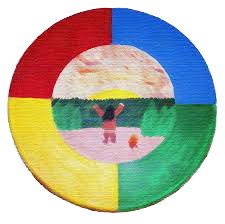We Are Our Stories
Hasn't it been an interesting year so far? I use the word "interesting" deliberately, thinking of the old (supposedly, but not) Chinese curse, "May you live in interesting times!" Wherever it comes from, it seems appropriate for the year 2020. These are interesting times, and sometimes I wonder whether we are really living or merely surviving.
And yet there have been some developments that may bode well for the future. One of these is surely the advent of the BIPOC movement. From tragic events, including the murders of George Floyd in the US and Chantel Moore in New Brunswick (during a "wellness check" of all things), it feels like a collective and powerful sense of outrage has overflowed like a spring creek gone wild. People are raising their voices and their fists. Old attitudes are being challenged. Racists are being called out, even those who hold positions of power.
BIPOC of course stands for Black, Indigenous and People of Color. It was heartening to see the inclusion of "Indigenous" in this acronym. You get no argument from me whatsoever that black lives matter. That should never be qualified in any way, shape or form. Yet at the time of those killings which happened only a few days apart, while I was not surprised at the intensity of the rage over the death of George Floyd, I was somewhat dismayed that it so overpowered reactions to the death of Chantel Moore. She was a Canadian, after all. Ah, but an Indigenous Canadian, and a woman at that, and therein lies the problem.
As a nation, we have somehow become inured to violence inflicted upon Indigenous women. Inured even to their violent and often mysterious deaths. The figures are alarming and depressing. For example, murders of Indigenous people in Canada account for over 20% of the total, yet they only account for 5% of the population. It's worse for women than men. Everyone knows it. But it never seems to change.
Will it change now? Does the BIPOC movement have enough momentum and courage to end all kinds a racist activities and attitudes? Or will we be asking these same questions next year, and the year after, and on and on and on?
One way, strategy, if you like, to subvert a race of people is to take away their narrative. Hard to do, you have to be organized and have the resources as well as the diabolical will to do such a thing. But that's exactly what the government of Canada set out to do, with the help of the churches, through the residential school system.
One way to help instill a sense of cultural pride, if not restore the culture itself, is through narrative. We are our stories. One way to end racism is to listen to the stories of all people, whatever their skin color or ethnic origin.
I think that's the reason I get hired by Stardale to work with the girls: I seem to be able to get them to share their stories, their thoughts and their worries, their sense of place in this mad world of ours.
This is what we did this winter. We gathered stories from the girls for a piece titled The Road. We thought the girls would perform this piece back in May but of course, a little pandemic laid those plans to rest.
We are determined that those stories will be told, and that they will be heard. Silence no more. Our girls' voices will be heard. We are transforming our live performance piece into a video which we will eventually be able to share far and wide.
You can look for that in the fall. And that's all from me, for now.
Stay strong, stay safe!

